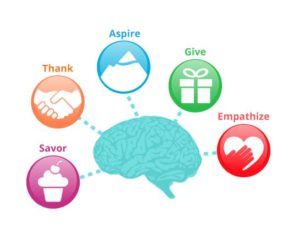Given the demands of the modern world, many people find solace and relaxation when they disconnect from their smart phones, computers and email. But what if you could improve your overall happiness simply by playing games on your phone? In a recent interview, tech entrepreneur and co-founder of Happify Ofer Leidner said gamification can make people “happier”, and that the development of technology that improves well-being is only just getting beginning.
Image credit: x-bility.comIt should be noted that not just any game on your phone can help one live a happier, healthier life. Instead, Happify and other comparable platforms use science-based games to drive behavior and to help people learn skills for generally improving their outlook on life. It’s still gaming and gamification, but gaming done with a meaningful purpose.
“After telling us a little bit about themselves, we recommend a certain track, which is a topic around which (Happify users) want to build those skills for greater emotional fitness. We then prescribe for them a set of activities and interventions that have been transformed into an interactive app,” Leidner said. “You can do them on your phone, when you’re commuting, or you can do it at night. What we’re doing, in terms of the measurement of improved outcome, is we’re actually measuring them based on scientific event reports.”
Leidner said that Happify and other apps like it aren’t inventing the science, but rather translating existing interventions, studies, and research; this data suggests that an overall happiness index is determined by one’s ability to experience positive emotions and overall life satisfaction. While that may seem like a nebulous target, he said there’s plenty of research to back it up.
In addition to the behavioral science aspect of gamification technology, Leidner also cites evidence of its efficacy in a neuroscientific approach. Seeing the notable changes in functional MRI brain scans as a result of gamification-driven behavior is what led him to make applications that could engage and benefit society on a grander scale.
Leidner acknowledges that happiness is a charged term that can mean many things to different people. But in a world with both objective and self-reported measurements, it’s what the user does with the feedback from those gaming measurements that will make the difference. “To give you a simple example, you will not be able to be happy if you’re sleep deprived. It doesn’t matter. Sleep deprivation is the number one technique to make you unhappy,” Leidner said. “I think the important thing is not just to measure, but what do you do with the measurements.”
Looking to the future, Leidner sees more gamification-driven applications and hardware on the horizon that will help people learn to live happier, healthier lives, including existing health applications like HealthKeep. Future app technologies will likely also collaborate with sensors in your body to help calibrate self-reported information (like mental state) with objective physical measurements, in turn improving recommended activities and better tailoring apps to enhance an individual user’s happiness and well-being.
Beyond that, Leidner also predicts that augmented and virtual reality will play a big role in improving people’s lives in the future. Such technologies, he said, will help people escape from their lives and emotions while helping them learn how to use more of their “mindfulness muscle”.
“There is a theme that says technology is not the way. If you want to live well and live happier lives, disconnect from technology, shut down your devices,” Leidner said. “We’re basically saying, ‘We’re not gonna’ shut down our devices. We’re just gonna’ turn the focus to apps and technology and services that help us create more meaningful lives. Augmented reality can play a very important role (in that) I think.” As with anything else, our new apps are a tool, one that can be used for ill or for good; eliminating this technology from our lives may not be realistic, but choosing how we use these technologies is within every free person’s realm of personal choice.
